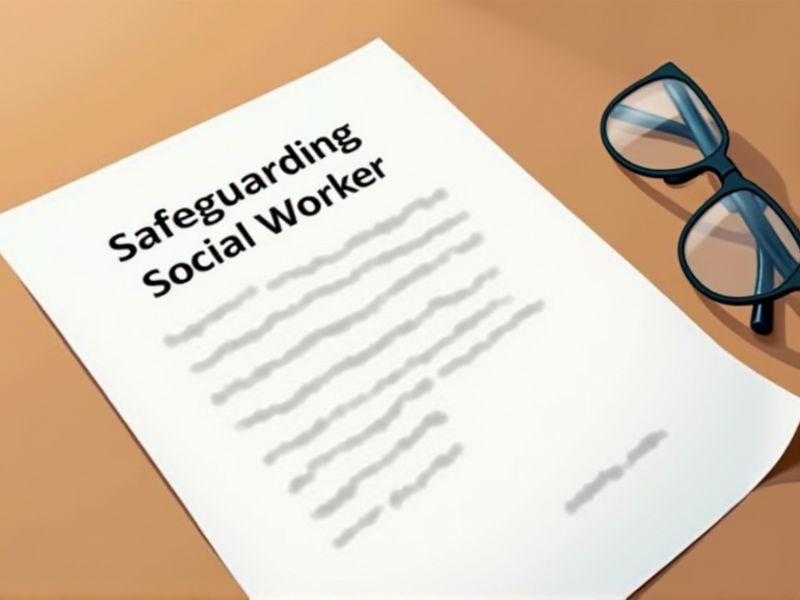
Safeguarding Social Workers operate in environments that require the highest level of trust and safety, primarily to protect vulnerable populations. These roles demand a profound understanding of legal regulations, ethical considerations, and risk management, for which specialized certifications provide necessary expertise. Certification programs ensure professionals are equipped with the skills to effectively identify and mitigate potential threats to well-being. Essential certifications for a Safeguarding Social Worker include those addressing areas critical to their responsibilities.
Safeguarding Adults and Children Certification
Safeguarding Adults and Children Certification ensures social workers have the knowledge to identify potential abuse or neglect cases effectively. It empowers them with skills to implement preventive measures, reducing the incidence of harm. Certification provides a benchmark of competence, ensuring all social workers meet standardized practices. It increases trust from clients and the community, knowing trained professionals are equipped to handle vulnerabilities.
Child Protection and Welfare Accreditation
Child Protection and Welfare Accreditation ensures social workers possess the necessary skills and ethical standards to handle sensitive cases involving vulnerable children efficiently. It provides a structured framework for continuous professional development, promoting best practices in safeguarding efforts. Accredited training helps reassure families and communities that social workers are equipped to protect children effectively. Enhanced trust in social work services stems from the assurance that practitioners are adequately qualified and regularly evaluated.
Mandatory Safeguarding Training in Social Care
Mandatory safeguarding training in social care enhances the ability of social workers to identify signs of abuse or neglect, ensuring timely intervention. Enhanced knowledge from training ensures compliance with legal and ethical standards, reducing the risk of malpractice. Training fosters a consistent approach to safeguarding, promoting effective collaboration among professionals. Regular updates keep social workers informed about evolving risks and necessary protective measures.
Mental Health First Aid Certification
Mental Health First Aid Certification equips safeguarding social workers with vital skills to identify early signs of mental health issues, enabling timely intervention and support. This certification enhances their ability to communicate effectively with individuals experiencing mental distress, fostering a more empathetic and supportive environment. Understanding mental health challenges reduces stigma within the community and promotes a more inclusive approach to care. Consequently, equipped social workers can improve outcomes for individuals at risk and support their long-term well-being.
Crisis Intervention and Risk Assessment Certification
Crisis Intervention and Risk Assessment Certification equips safeguarding social workers with the skills necessary to identify and address immediate dangers in complex social situations. Certification provides structured methodologies for assessing risks accurately, preventing harm to vulnerable individuals. This training enhances the social worker's ability to make informed decisions swiftly, improving outcomes in volatile environments. Mandating such certification ensures a consistent standard of care, reinforcing professional accountability and competency in safeguarding roles.
Trauma-Informed Care Certification
Trauma-informed care certification equips safeguarding social workers with skills to recognize and respond to trauma, leading to more effective support for those affected. Understanding the underlying trauma can significantly improve interventions and reduce the risk of re-traumatization in vulnerable individuals. This certification enhances a social worker's ability to build trust and rapport with clients, facilitating more successful outcomes. Agencies prioritizing trauma-informed practices often see improved staff retention and client satisfaction, reflecting its value in social work.
Data Protection and Confidentiality Training Certificate
Data protection and confidentiality training ensures social workers understand legal obligations, which helps protect sensitive client information. When social workers maintain confidentiality, trust is built with clients, facilitating more effective support and intervention. Training equips social workers with skills to navigate complex privacy concerns, reducing the risk of data breaches. Such certification demonstrates a commitment to ethical standards, enhancing professional credibility and safeguarding clients' rights.
Cultural Competence in Social Work Certification
Cultural competence in social work certification helps safeguarding social workers understand diverse cultural contexts, which increases the effectiveness of their interventions. This knowledge reduces the risk of cultural misinterpretations that could compromise client trust and safety. Training in cultural competence equips social workers with tools to address unique challenges faced by marginalized communities. Recognizing and respecting cultural differences ensures that social workers can better advocate for equitable treatment and justice for all clients.
Ethical Practice in Social Work Certification
Ethical practice in social work certification ensures that social workers adhere to professional standards, which directly impacts the quality of care delivered to clients. When social workers are certified in ethical practices, it minimizes the risk of harm to vulnerable populations by enforcing accountability. This certification also equips social workers with a framework for decision-making, protecting them legally and professionally. The demand for such certification arises from the necessity to maintain public trust in social services.
Children's Rights and Welfare Certification
The necessity of Children's Rights and Welfare Certification for safeguarding social workers arises from the increasing complexity of child welfare cases. This certification provides these professionals with standardized knowledge and skills to recognize and address children's rights violations effectively. When social workers are certified, there is a demonstrable improvement in the quality of interventions aimed at protecting children. A certified social worker fosters greater trust with families and communities, which is essential for successful child welfare outcomes.
Summary
With additional certifications, you'll likely enhance your skills and knowledge as a Safeguarding Social Worker. Certified expertise often improves your ability to assess and handle complex cases effectively. Your professional credibility is likely to increase, potentially leading to better job opportunities. You'll be more equipped to make informed decisions, directly impacting the safety and well-being of those you serve.
